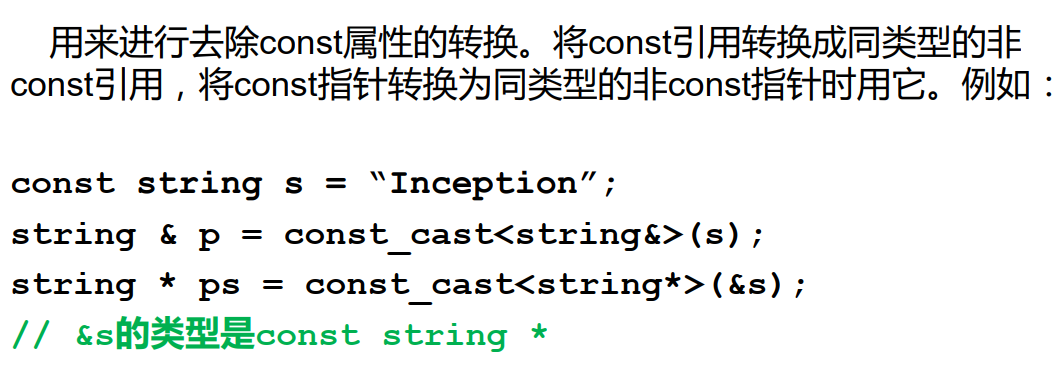- static_cast
- interpret_cast
- const_cast
- dynamic_cast
static_cast

#include <iostream>using namespace std;class A {public:operator int() {return 1;}operator char*() {return NULL;}};int main() {A a;int n; char* p = "new Dragon Inn";n = static_cast<int>(3.14); // n的值为3n = static_cast<int>(a); // 调用a.operator int, n的值为1p = static_cast<char*>(a); // 调用a.operator char* p的值为NULLn = static_cast<int> (p); // 编译错误,static_cast不能将指针转换成整型p = static_cast<char*>(n); // 编译错误return 0;}
reinterpret_cast

#include <iostream>using namespace std;class A {public:int i;int j;A(int n):i(n), j(n){}};int main() {A a(100);int & r = reinterpret_cast<int&>(a); // 强行让r引用ar = 200; // 把a.i变成200cout << a.i << "," << a.j << endl; // 输出200,100int n = 300;A * pa = reinterpret_cast<A*>(& n); // 强行让pa指向npa->i = 400; // n变成400pa->j = 500; // 不安全,很可能崩溃cout << n << endl; // 输出400long long la = 0x12345678abcdLL;pa = reinterpret_cast<A*>(la); // la太长,只能取低32为0x5678abcd拷贝给pa// 在64位的机器上不行,因为指针是64位的,而unsigned int 是32位的unsigned int u = reinterpret_cast<unsigned int>(pa); // pa逐个比特拷贝给ucout << hex << u << endl; // 输出5678abcdtypedef void (* PF1)(int);typedef int (* PF2)(int, char*);PF1 pf1; PF2 pf2;pf2 = reinterpret_cast<PF2>(pf1); // 两个不同类型的函数指针}
const_cast
dynamic_cast

dynamic_cast是通过检查虚函数表的指针来判断该类是否为多态类的
#include <iostream>#include <string>using namespace std;class Base {public:virtual Base() {}};class Derived: public Base {};int main() {Base b;Derived d;Derived * pd;pd = reinterpret_cast<Derived *>(&b);if(pd == NULL) //此处pd不会为NULL。 reinterpret_cast不检查安全性,总是进行转换// 不会执行cout << "unsate interpret_cast" << endl;pd = dynamic_cast<Derived *> (&b);if(pd == NULL) //结果会是NULL,因为 &b不是指向派生类对象,此转换不安全cout << "unsafe dynamic_cast1" << endl; // 会执行Base * pb = & d;pd = dynamic_cast<Derived*>(pb); // 安全的转换if(pd == NULL)cout << "unsafe dynamic_cast2" << endl; // 不会执行return 0;}



